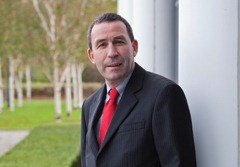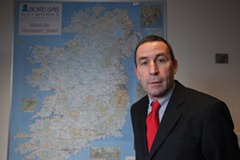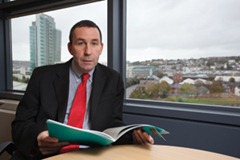John Barry: a strategic future for gas
 Head of Bord Gáis Networks John Barry talks to Owen McQuade about the importance of natural gas for Ireland’s energy mix and how he anticipates a strong future for the fuel.
Head of Bord Gáis Networks John Barry talks to Owen McQuade about the importance of natural gas for Ireland’s energy mix and how he anticipates a strong future for the fuel.
Natural gas is an important fuel in Ireland and will remain so for the “foreseeable future”, John Barry contends.
The Head of Bord Gáis Networks notes that the country currently generates about 60 per cent of its electricity from gas and emphasises that a secure supply (including via interconnectors) will be important to back up the renewable energy sector.
“As more renewables come on stream, clearly that would fall off,” he says of the fuel’s powergen market share, “but the important thing to bear in mind is that there would have to be back-up reserve for when wind doesn’t blow. That will require more flexible operation of the gas network over time as more renewables hit the system.”
Bord Gáis Networks’ key challenge is to keep providing “a safe, robust and resilient system to meet current and future gas demand” with greater efficiency.
He explains: “There’s always a commercial challenge to operate more efficiently and to be more innovative in how we offer the services we do, because of the impact that has on transportation tariffs.”
To achieve cheaper tariffs, Bord Gáis Networks is aiming to increase utilisation of the gas network e.g. developing compressed natural gas as a transport fuel.
Alongside that innovation, the company has recently completed a major internal transformation programme, covering three areas: people, processes and technology. Its transmission and distribution businesses have been merged over the last three years, and the “cross-skilling” of staff allows them to operate in both areas. The entire organisation has been realigned to a high performance utility model (HPUM), which reflects international best practice.
The end result is a stronger focus on asset management “and that will deliver real efficiencies in time as we develop asset programmes and we look at whole-life costing”.
At present, Bord Gáis Networks does much of its work on behalf of Gaslink, the licensed network operator in the Republic of Ireland. Bord Gáis Networks owns the transmission and distribution assets in the Republic, and also owns infrastructure in Great Britain and Northern Ireland through its subsidiary BGE (UK) Ltd.
The company carries out a wide range of engineering services (modelling, design work, conceptual and detail) in-house. It outsources all its construction work but retains some in-house construction expertise. The grid is operated through the grid control centre in Cork and gas control centre in Dublin.
Maintenance is a substantial part of its remit. Bord Gáis Networks operates the Scotland-Northern Ireland Pipeline under contract for Mutual Energy. It also has a 24-7 nation-wide response capability (largely outsourced) across the grid, and receives 20,000-250,000 calls per year.
“We’re a 90 per cent outsourced organisation,” he comments, adding: “We do retain a core competency in-house to manage many of the activities.”
In the UK, Bord Gáis Networks has won the Customer Contact Association (CCA) International Customer Service Awards in 2009 and 2010: “We would be considered to be best in class in customer services and that has been validated by the awards that we’ve won and the customer satisfaction measures that we track.”
As an offshoot, it also runs a small telecoms business (Aurora Telecom) which provides and sells dark fibre. Aurora is carrier-neutral and has been leveraged off the back of Bord Gáis Networks’ ducting laid alongside the major cross-country pipelines.
“We’ve gone through an enormous transformation as an operating model internally,” he comments, “and I think that will set us up well for the future as a business and possibly allow us to look at other utility areas such as water which is due to undergo major reform in the coming years.
Regulation
The conversation turns to the EU’s Third Energy Package, which is having a “minimal impact” at an operational level (except perhaps improving efficiency) but bringing about a “major structural change” for the organisation.
“Effectively, Bord Gáis Networks and Gaslink will merge and become the independent transmission operator,” he points out. “It will be an independent subsidiary with its own board, and will have stricter and more restrained reporting lines into the main board.”
“I’m in the company since 1997 and this is probably the biggest structural change that we’ll undergo because effectively it creates an independent organisation, albeit part of a VIU (vertically integrated utility) with much more restrictive reporting arrangements. These will be primarily on the financial side rather than the day-to-day operation.”
Meanwhile, the Common Arrangements for Gas (CAG) are progressing more slowly. These would create an all-island gas market, and Barry comments that CAG will be a “very welcome development” in the industry.
“I think that there are many hurdles to overcome to get to the point where it will be delivered,” he says, “but I think the vision that’s been created by the regulators, by the industry and by the relevant departments is very noble and I think we’ll ultimately deliver it.
CAG will add value to the industry and will also send out the correct signals to people who want to invest in, for example, storage into the future.”
Barry surmises that “ultimately it’s good for the industry and certainly BGN/Gaslink is playing its part in the ultimate delivery of the programme.”
Change and future
A “massive investment in infrastructure” north and south of the border has doubled the size of the network since 1997, enabling “more people across a wider geographical base” to receive a gas supply.
Expansion has occurred through interconnectors, the Pipeline to the West and the North West and South/North pipelines in Northern Ireland.
Barry also includes the Corrib Gas project in the list and hopes the gas will come ashore in the next two years. This would add another entry point to the system and, equally importantly, provide indigenous security of supply.
“I sincerely hope that Corrib will be delivered in the timeframe that’s now being spoken about by the developers,” he remarks, pointing to its importance to Ireland as nation in terms of security of supply.
More generally, he credits the Commission for Energy Regulation and its Connections Policy for the foresight to allow the grid to develop, so that consumers had a choice of fuel.
European legislation is having an increasing impact on the market and the company has seconded two staff to work with ENTSO-G in Brussels, which he believes makes it the first organisation to do so.
Continental Europe is already leading the way in natural gas vehicles and Barry is “particularly excited” about this development.
The International Association for Natural Gas Vehicles estimates that over 1.3 million NGVs were operating in the continent in 2010. He recalls discussions about natural gas in transport as far back as 1993 and the company has now reactivated its interest in this field.
Lower emissions and lower costs are both possible.
“From a commercial view point, NGVs are cheaper to operate,” Barry comments. “There have been financial savings up to 60 per cent, which is quite significant for people managing fleets in a competitive environment, where they’re trying to reduce costs.”
He is keen to stress that the technology is proven, with many European vehicles fuelled by compressed natural gas: “All we want is to try and be a catalyst for the emergence of that industry, as a provider of infrastructure.
We’re very keen to try and find ways where we can use our network more efficiently and get more usage on it. And we see the use of natural gas as a transport fuel transport as providing that.”
Bord Gáis Networks is concentrating on commercial transport, where it currently sees most value e.g. in fleets which come back to a depot at night for refuelling.
The commercial benefits, he predicts, will speak for themselves: “I’m quite confident that over the next number of years, you will see natural gas as a transport fuel develop.”
Enduring fuel
It is put to him that gas was likened to a transition fuel a few years ago i.e. necessary until renewables reached their capacity but not afterwards.
He now adds: “With the advent of shale gas and the change of dynamic it has had in the industry, the talk has changed to it being more of an enduring fuel rather than a transitionary fuel or a bridge.”
Renewables growth is “still the way to go” but shale gas provides plentiful supplies in the marketplace and ensures that gas will be around for a lot longer.
“It is obviously a very important fuel in the mix of energy in this country, and will remain so for quite a number of years to come,” he restates.
Indeed, the Fukushima nuclear accident in Japan in March resulted in more people going back to combined cycle gas turbines. On that basis, Barry expects that natural gas is “going to remain as important into the future.”







